Key takeaways:
- Textbook budget constraints impact both students and institutions, leading to difficult financial decisions and potential compromises in educational quality.
- Prioritizing essential resources, negotiating bulk purchases, and utilizing open educational resources can significantly help manage textbook costs.
- Evaluating textbook options based on relevance, format, and peer recommendations can lead to more effective and affordable choices.
- Tracking expenses diligently and utilizing budgeting apps empowers students to make informed financial decisions and avoid overspending on textbooks.
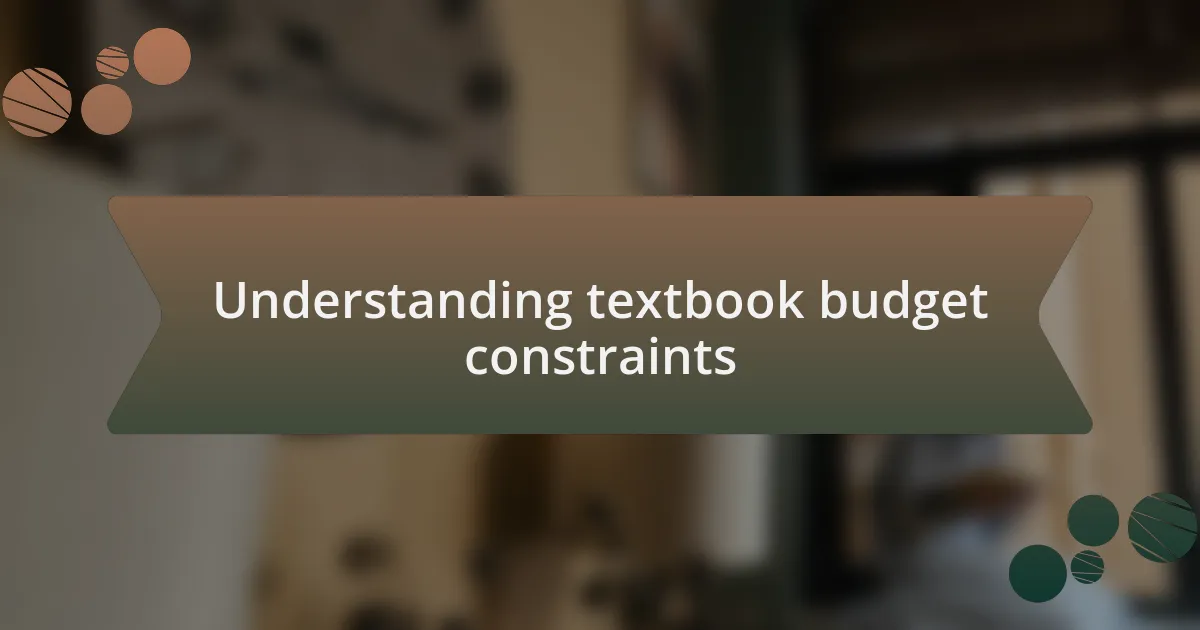
Understanding textbook budget constraints
When I think about textbook budget constraints, I can’t help but recall my own struggles during college. Juggling finances is no small feat, especially when a single textbook can cost as much as a month’s groceries. It makes you wonder, how can we prioritize learning when it often comes at such a steep price?
One key aspect that often gets overlooked is how these constraints influence both educators and students. I remember feeling disheartened when I realized some classmates couldn’t afford required texts, which impacted our group discussions and overall learning experience. Have you ever felt the weight of that decision between buying a textbook or paying a bill? It’s frustrating, to say the least.
Additionally, it’s essential to recognize that budget constraints often lead to difficult choices for institutions as well. They must decide which resources to prioritize, leading some courses to rely on older or less effective materials just to stay within the budget. It makes you question: Is the quality of education being compromised due to financial limitations? In my experience, finding a balance between cost and quality is a constant challenge, and it’s one that requires ongoing dialogue and innovation.
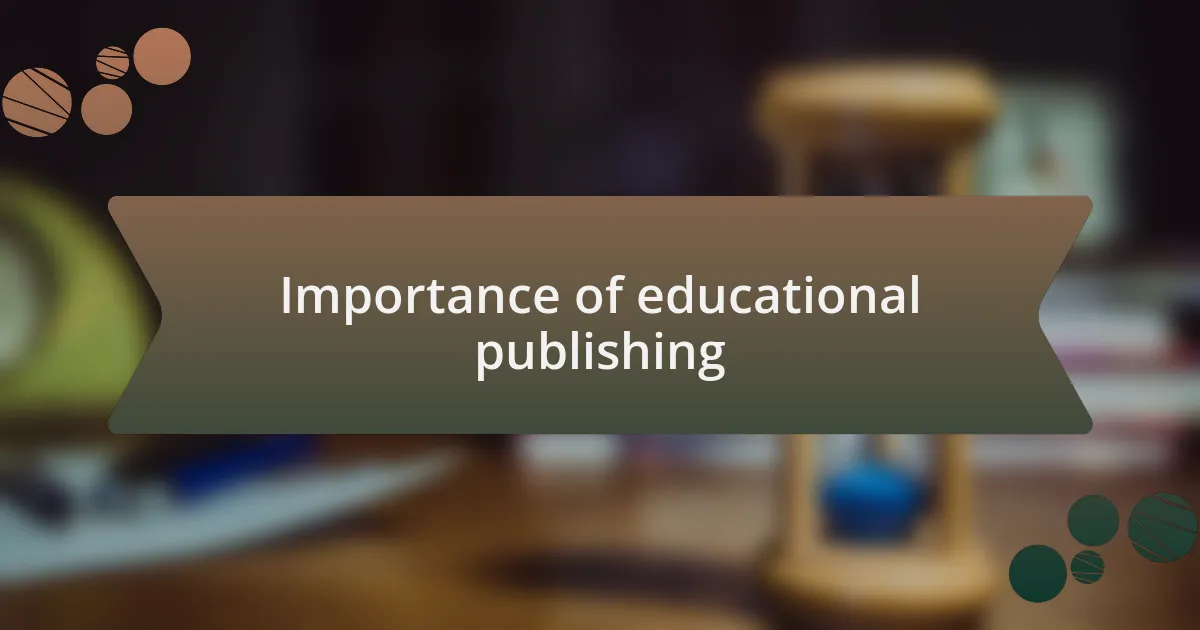
Importance of educational publishing
Educational publishing plays a crucial role in shaping the resources available to learners and educators alike. I recall a time when I stumbled upon a well-crafted textbook that not only sparked my interest but also opened my eyes to new concepts and ideas. Have you ever felt that thrill when a particular book just clicks with you? This is the power of quality educational materials—they can transform the learning experience and ignite a passion for knowledge.
Moreover, investing in educational publishing helps ensure diversity in perspectives and topics. I remember vividly how certain books introduced me to cultures and histories I had never encountered before. Without a robust publishing industry, these voices could remain unheard, depriving students of a well-rounded education. Isn’t it essential for learners to engage with a variety of viewpoints to fully understand the world around them?
Finally, the impact of educational publishing extends beyond the classroom. I often think about how well-published resources lay the groundwork for lifelong learning. They not only prepare students for exams but also cultivate critical thinking and problem-solving skills essential for their future careers. How can we underestimate the importance of well-written, accessible materials in fostering these abilities? In my experience, they are the bedrock upon which successful learning is built.
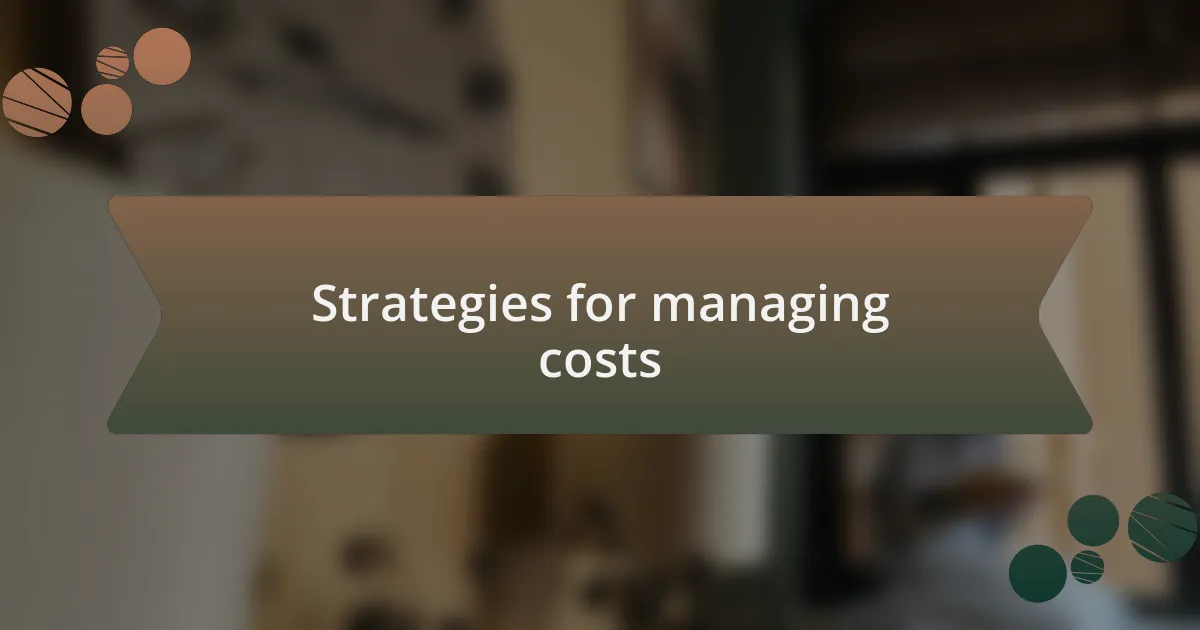
Strategies for managing costs
The first step in managing costs effectively is to prioritize essential resources over supplementary ones. I remember a semester when I carefully analyzed my syllabus and realized I only needed a couple of core textbooks, while many of the recommended readings were optional. This focused approach not only saved me money but also allowed me to dive deeper into the material that truly mattered for my studies. Have you ever thought about trimming down your required reading list for greater impact?
Negotiating bulk purchases for educational materials can also yield substantial savings. At one point, our study group pooled our resources to purchase multiple copies of the same textbook, resulting in a discount that made each copy significantly cheaper. This collaborative effort not only lightened our financial burden but also fostered camaraderie among us. Isn’t it amazing how teamwork can turn a daunting cost into a manageable one?
Another effective strategy is to seek out digital resources and open educational resources (OER) that are often available for free. I remember feeling relieved when I discovered an entire online library of textbooks that covered my course topics without any cost. This shift not only supports my budget but also encourages the move towards more sustainable learning practices. How often do we overlook these valuable tools in favor of traditional print materials?
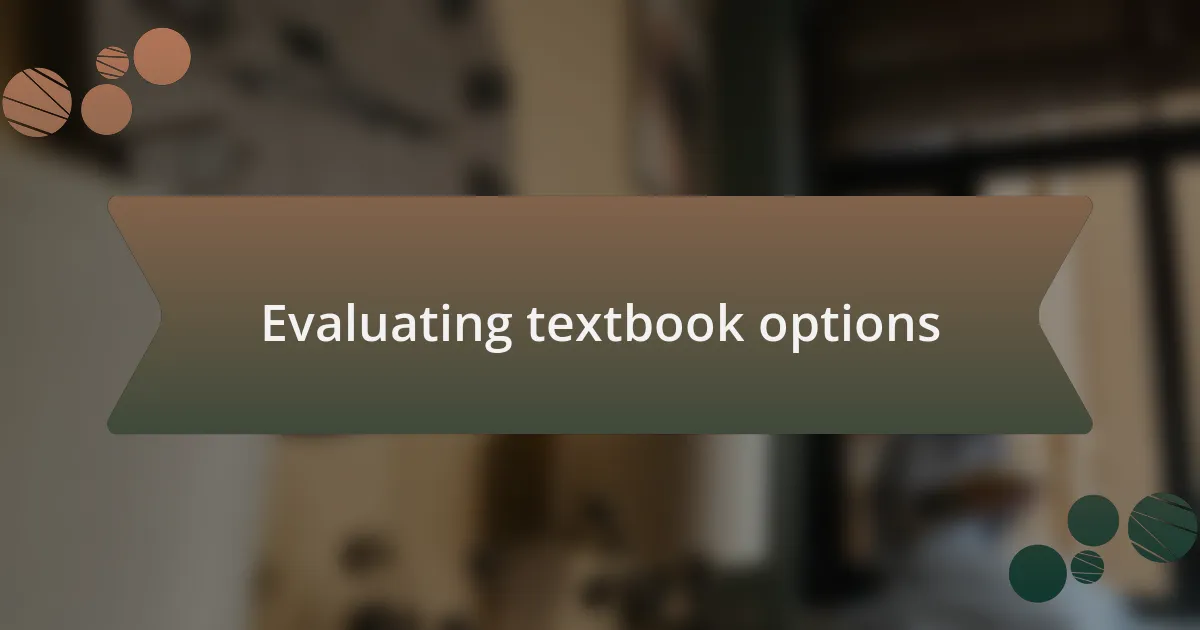
Evaluating textbook options
When evaluating textbook options, it’s crucial to consider the content’s relevance and applicability to your coursework. I recall a time when I meticulously compared several editions of the same textbook, discovering that the newer version contained only minor updates and a few new examples. Realizing this allowed me to opt for a more affordable used edition, which still captured the essence of what I needed. Have you ever assessed whether the latest edition is truly worth the extra cost?
Another important factor is the format of the textbook. I’ve often found that e-books can be significantly cheaper than their print counterparts. For one course, choosing a digital version not only saved me money but also gave me the added benefit of searching for key terms quickly. Isn’t it liberating to have all your materials in one device, especially for those late-night study sessions?
Lastly, it’s essential to look for reviews or recommendations from fellow students or faculty. I remember chatting with classmates who had taken a similar course previously, and their insights led me to a textbook that was more reader-friendly and engaging. Learning from others’ experiences can often guide you toward more effective and budget-friendly choices. How valuable is it to hear directly from someone who has walked the same path?
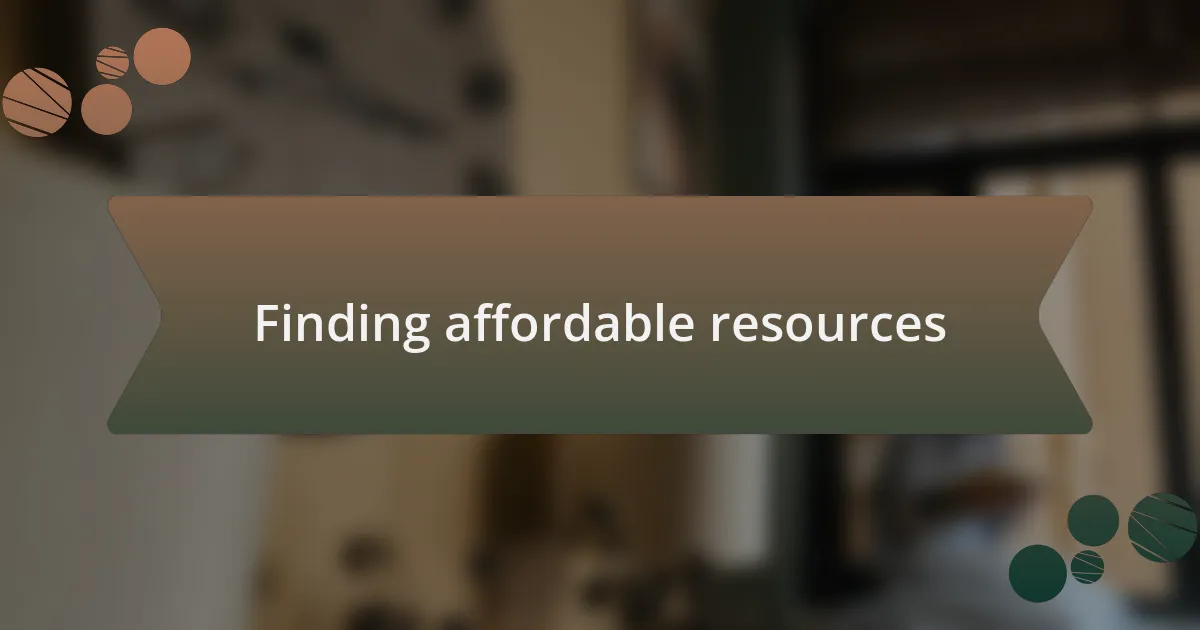
Finding affordable resources
When it comes to finding affordable resources, I’ve found that local libraries can be a hidden treasure. I remember visiting my university library and stumbling upon a treasure trove of textbooks on reserve for my courses. Not only did I save money, but I also discovered resources I wouldn’t have considered otherwise. Have you ever thought about how many valuable learning materials are just a short stroll away?
Another strategy I’ve leveraged is connecting with classmates to share resources. During one semester, a few friends and I formed a textbook exchange group. We pooled our resources, which allowed us to access a wider range of materials without each of us having to purchase everything. It fostered a sense of community and collaboration that was truly rewarding. Have you ever explored leveraging your network to cut costs?
Lastly, online platforms and second-hand bookstores can offer fantastic deals. I vividly recall finding a reputable website that specialized in used textbooks, where I snagged an edition at a fraction of the retail price. The excitement of receiving a like-new book in the mail is something I still remember vividly! Have you checked out any alternative marketplaces to uncover your next great resource?

My personal budgeting tips
One budgeting tip I swear by is to always create a spending plan before the semester begins. I remember the feeling of anxiety that washed over me every time I approached the campus bookstore without a clear budget. Setting a specific limit helped me prioritize which texts I truly needed and avoid impulse buys. Have you ever found yourself buying unnecessary materials just because they were in front of you?
I also keep an eye out for digital versions of textbooks, which can be significantly cheaper than their printed counterparts. There was a time when I stumbled upon an eBook version of a dauntingly expensive textbook. Not only did it save me a hefty sum, but the added convenience of having it available on my tablet for easy access during lectures was a game-changer. Have you explored the advantages of going digital to save money?
Finally, I’ve learned the importance of timing when making purchases. I remember the relief I felt when I decided to hold off on buying a new textbook until I did some research. Waiting for sales or considering rental options taught me that patience can significantly impact my budget. How often do we rush into a purchase only to regret it later?
![]()
Tracking expenses effectively
Keeping a detailed record of my textbook expenses each semester has been a game changer for managing my budget. I started using a simple spreadsheet to track purchases, which helped me see exactly where my money was going. It’s surprising how easy it is to lose track of small expenses that, when added up, can impact the overall budget significantly. Have you ever looked back and wished you had a clearer picture of your spending?
In my experience, reconciling expenses weekly has provided me with a clearer understanding of my financial habits. For instance, I once discovered that my late-night impulse buys from online sellers had added up to an unwanted surprise. I felt a mix of frustration and regret, prompting me to set weekly check-ins. This habit not only keeps me accountable but also allows me to adjust my spending in real time to avoid frustration later. Have you considered how regular tracking might change your budgeting habits?
I also find that using mobile apps to track expenses makes the process seamless and immediate. There’s something incredibly satisfying about jotting down a workbook purchase right after the transaction, almost like it solidifies my decision. One semester, I faced textbook costs that spiraled beyond my expected budget, but accessing my app helped me identify trends. By quickly adjusting my spending elsewhere, I learned how tracking expenses could empower my financial decision-making. Isn’t it refreshing to take control of your finances rather than letting them control you?